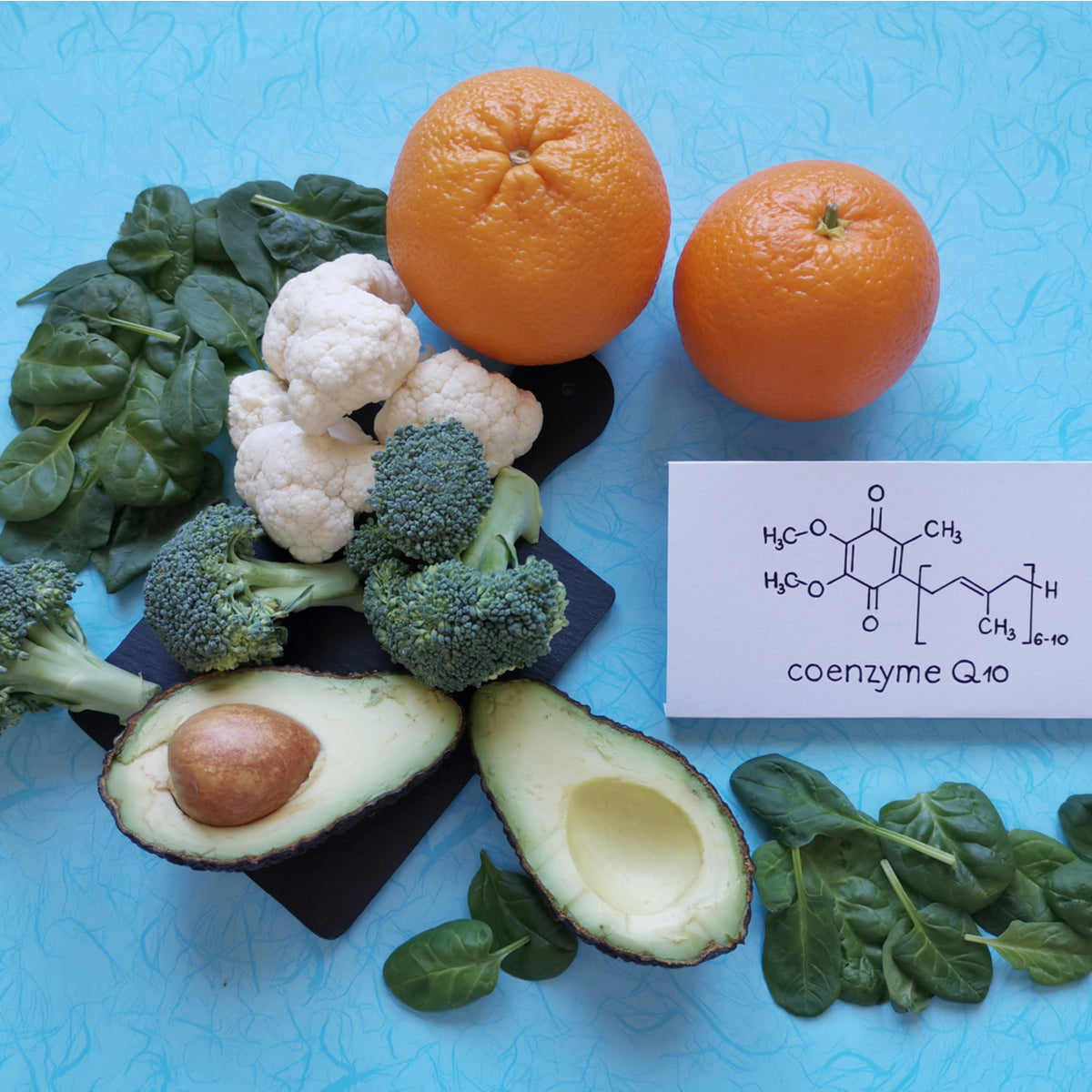Coenzyme Q10, or CoQ10, is an antioxidant that is involved in energy production. It’s not a vitamin because your body can produce it, but it is in many foods and it acts like some vitamins. If you’re wondering about the health benefits of CoQ10, keep reading. There may be many!* And also keep reading to find out side effects of CoQ10 and why a CoQ10 Vitamin Patch may be the right choice for you, if your doctor agrees.
Roles of Coenzyme Q10 in the Body
Coenzyme Q10 is needed for producing energy from fats and carbohydrates. This happens in a part of the cells called the mitochondria.
Another role of CoQ10 may be related to getting rid of cellular waste. Coenzyme Q10 helps cells maintain the proper pH, or acidity, that they need to transport waste across the membranes of lysosomes, which are responsible for this process.
A well-known function of CoQ10 is its role as an antioxidant. Antioxidants are necessary for protecting cell membranes and compounds called lipoproteins from oxidative damage. Coenzyme Q10 also works to support the reuse of antioxidants such as vitamin E and vitamin C.
Benefit: Improved Outcomes in Heart Failure Patients
Among the best known health benefits of CoQ10 may be its use in patients with congestive heart failure. That’s a condition when the heart doesn’t get enough blood or oxygen. It can result from coronary heart disease, or buildup of plaque in the arteries. It can also result from high blood pressure or a heart attack.
Heart disease is linked to a low level of CoQ10 in the blood. It’s possible that getting CoQ10 levels to normal could improve outcomes in congestive heart failure.* Coenzyme Q10 has also been looked at to help the heart recover from injury, such as after coronary artery bypass graft surgery.
Benefit: Healthier Heart in High-Risk Patients
Diabetes is a condition with higher than normal levels of blood sugar. Having diabetes increases the risk of having high cholesterol levels in the blood. That’s a risk factor for heart disease, in part because it interferes with normal function of blood vessels and blood flow. It appears that CoQ10 may be linked to improved function in people with diabetes as well as people with coronary heart disease.
If you do have diabetes or other risk factors for heart disease, it’s important to work closely with your doctor to manage blood sugar or other indicators. Lifestyle changes are usually necessary to get the condition under control, and medications are often needed as well.
Benefit: Fewer Side Effects of Statins
Statins are cholesterol-lowering drugs. They’re very common, and many healthcare providers believe they should be prescribed even more often to prevent heart attacks. However, statins can also have side effects, such as muscle pain and insulin resistance. It’s possible that low levels of CoQ10 can contribute to these types of effects.
Benefit: Maintenance of Fertility
On average, women have a dramatic decrease in fertility starting around age 30 and dramatically speeding up around age 35. There are a few reasons for this, and some reasons may be related to a decrease in the number of high-quality eggs that a woman has.
A deficiency of CoQ10 could be related to loss of fertility in women who are older than prime reproductive age. Providing CoQ10 to women who are deficient could help protect egg quality and support fertility.
Coenzyme Q10 may also support fertility in men for similar reasons. That is, sperm quality can decrease when there is not enough CoQ10. Coenzyme Q10 may help increase antioxidant activity that protects sperm from losing their quality.
It’s best to talk to your doctor if you believe you may be having trouble with infertility. Many treatments are available, and it is best to talk about it sooner rather than later. About 1 in 8 couples have trouble conceiving or carrying a pregnancy to term.
Benefit: Improved Athletic Performance
The effects of CoQ10 on athletic performance could be related to a few factors. First, many studies have looked at whether CoQ10 supplementation leads to better endurance or anaerobic performance. Some studies have shown positive results.
Something else to consider when thinking about CoQ10 and athletic performance is its roles as an antioxidant and a possible anti-inflammatory compound. It’s possible that CoQ10 could support faster recovery after a tough workout by reducing muscle damage or speeding muscle repair.
If you are working towards an athletic goal or a fitness goal, it’s always best to do so safely and with your doctor’s approval. You can support better outcomes by being consistent, working within your abilities, staying hydrated, and eating a nutritious diet to support your training or exercise program.
Benefit: Fighting Atherosclerosis
Atherosclerosis is a hardening of the arterial walls. It’s linked to poor outcomes, such as stroke and heart attack. The process of developing atherosclerosis may include LDL (low density lipoproteins) getting trapped in the walls of the arteries. These proteins can get oxidized and build up in the arterial walls. They can also attract immune cells, which further contribute to plaque formation and the risk for poor events.
It appears that CoQ10 can prevent oxidation of LDL. It works with vitamin E to do so. It also seems possible that health benefits of CoQ10 include reducing the migration of immune cells to the area with oxidized LDL. This reduces the formation of plaque.
Other steps to take to support healthy blood vessels and a healthy heart include eating well, maintaining or achieving a healthy weight, and being physically active. It’s best to talk to your doctor about any concerns you may have.
Benefit: Fight Migraines
Headaches and migraines may come when there isn’t enough energy production in the brain. Inflammation can also lead to pain. It’s possible that taking CoQ10, if you’re low in it, can help normalize metabolism and inflammation, which could prevent headaches.*
Other ways to fight migraines are to eat right, get enough sleep, and manage stress. Talk to your doctor if you do get frequent headaches or have migraines. There may be additional steps you can take to fight them.
Benefit: Lower Blood Pressure
Nearly half of US adults have high blood pressure or are on medications to lower blood pressure. Hypertension, or high blood pressure, increases the risk for stroke and heart attack, as well as for eye and kidney problems. Coenzyme Q10 may help lower blood pressure among people who have cardiovascular disease, though the research is mixed on that.*
A nutritious diet, high in fruits and vegetables and low in sodium, can help lower blood pressure. Other lifestyle changes to help lower blood pressure include losing extra weight if you are overweight or obese and exercising regularly. Your healthcare provider can help you monitor blood pressure and discuss medications if you need them.
Natural Sources of Coenzyme Q10
Many tissues of your body make CoQ10. It’s also in many foods, such as the following.
Still, supplements can have greater amounts of CoQ10 than food does. For example, a 3-ounce serving of beef has about 2.6 mg of CoQ10 and a tablespoon of soybean oil has 1.3 mg. The total average daily intake from diet is about 3 to 6 mg. In comparison, a CoQ10 supplement can contain 50 to 200 mg or more.
Coenzyme Q10 Deficiency
Deficiency of coenzyme Q10 can happen if there’s a genetic disorder that interferes with production of CoQ10. Providing CoQ10 can relieve some symptoms, such as muscular or neurological symptoms.
It seems as though levels of CoQ10 decrease with age. People with diabetes, congestive heart failure, and cancer tend to have lower CoQ10 levels. And, people on statins often have lower CoQ10 levels.
Coenzyme Q10 Supplements
Coenzyme Q10 supplements can come in different forms. One form is ubiquinol. That’s the form of CoQ10 that’s most common in the blood. In fact, 90% of the CoQ10 in your blood is in the form of ubiquinone. Supplements of CoQ10 can come in many forms. They come in capsules, liquids, and more.
Coenzyme Q10 Side Effects
Overall, CoQ10 supplements are considered to be on the safer side, though the side effects of CoQ10 can range.
A more common side effect of CoQ10 is an upset stomach. Gastrointestinal symptoms can include stomach pain, nausea and vomiting, and diarrhea. It’s also possible to lose your appetite when taking CoQ10.
Side effects of CoQ10 can include interacting with some kinds of medications, including the following.
- Certain antidepressants, such as selective serotonin reuptake inhibitors (SSRIs).
- Beta-blockers, which are often used to lower blood pressure, but can also be used in heart failure and to manage or prevent other heart conditions and migraines.
- Anticoagulants, or blood thinners, such as warfarin.
If you are on these or any other medications, it’s best to make sure you bring that up when you ask your doctor about health benefits of CoQ10 and whether you should take a CoQ10 supplement. As always, it’s good to be extra cautious if you are pregnant or breastfeeding.
Coenzyme Q10 Patches and Patch Packs
If you take CoQ10 in the form of a patch, you won’t be at risk for any side effects of CoQ10 that are related to digestion. That means there won’t be nausea, stomach pain, or diarrhea caused by digesting CoQ10.
The PatchAid CoQ10 Plus Patch has 100 mg of CoQ10 as ubiquinone. It also contains vitamin C, which is an antioxidant that is regenerated with CoQ10. Zinc is also in the patch, and it’s been taken to support wound healing and antioxidant functions. Other ingredients in the PatchAid CoQ10 Plus Patch are resveratrol and astaxanthin, which are both antioxidants.*
Additional PatchAid Vitamin Patches have CoQ10. These are some of them.*
- Anti-Aging Complete Topical Vitamin Patch. It contains CoQ10 as part of a Longevity Blend that also contains omega fatty acids and trans-resveratrol. Selenium, vitamin C, vitamin E, and vitamin A are other antioxidants in the patch. The patch also contains B vitamins and vitamin D, which are needed for normal metabolism, energy production, and blood cell function.
- Glutathione Plus Patch. It has 50 mg of CoQ10. Glutathione is a compound in the cells of your body. It helps manage waste products in your body so they don’t build up and cause harm to your body. Glutathione also has antioxidant activities. The patch also has alpha lipoic acid, n-acetyl cysteine, and selenium, vitamin C, and more.
- Omega-3 Vitamin Patch. This patch comes with 200 mg of CoQ10 as ubiquinol. Omega-3 fats, such as EPA, DHA, and ALA, are necessary for healthy cell membranes. Phosphatidylcholine is another ingredient in this patch that’s part of cell membranes. Astaxanthin is an antioxidant in this patch.
- Migraine Relief Patch. A migraine can wreck your day, and regular migraines can really put a damper on life. This patch has 150 mg of CoQ10. Essential vitamins and minerals in the patch include antioxidants and nutrients for metabolism, including vitamin C, B vitamins, and magnesium. Ashwagandha, feverfew, and butterbur extracts are herbal ingredients in this patch.
PatchAid vitamin patches are easy to use. You can apply them to a clean, dry area of skin. Leave them on for 8 hours, then discard them. You don’t have to worry about whether you’re taking them on a full or empty stomach. And, if your healthcare provider agrees, you can use multiple PatchAid patches at once.
*The Food and Drug Administration has not evaluated these statements. PatchAid patches are not intended to diagnose, treat, cure or prevent any disease. Anyone with a medical condition should seek the advice of a licensed medical practitioner. Individual results may vary.







